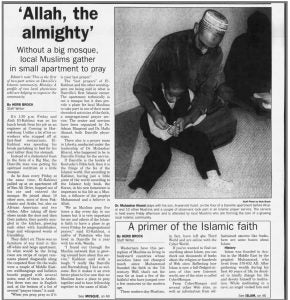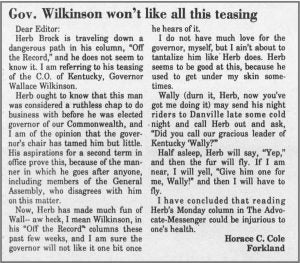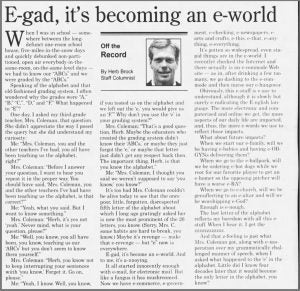Challenging the norms: Remembering former columnist and reporter Herb Brock
Published 7:00 pm Thursday, September 12, 2019

- Veteran journalist Herb Brock in January 2019. (Photo by Bobbie Curd)
Editor’s note: This story was previously published in The Advocate-Messenger’s 2019 Progress edition as a “Community Treasure.” Herb Brock, 70, passed away Sept. 11, 2019.
It’s usually hard to catch Herb Brock at a loss for words. However, with more than three decades’ worth of experience as a journalist, he does pause for a moment when asked: What was the hardest story you ever had to write?
“Hmm …” Brock says from the table of a coffee house. He looks out the windows for a second with a serious expression on his face.
“Most of what I did was boring. And I loved it that way,” Brock says with his infamous dry wit and deep voice. But don’t let him fool you.
Aside from a multitude of thought-provoking series and political stories, Brock also wrote a column titled “Off the Record with Herb Brock,” which started running after he came to work for The Advocate-Messenger in September of 1979.
Nothing was off limits, which sometimes got him in trouble. And he liked that.
Brock began when former editor John Davis was at the helm and longtime publisher Mary Schurz ruled the roost.
“Back in the day, they had VDTs — video display terminals — one of the first things representing a computer. Mary took me around the office and asked me if I was familiar with them. I said ‘sure.’ I’d never used one, just knew what they were. But hey — that’s familiarity, right?”
Brock would write his stories longhand at night on a legal pad, then come in around 5 every morning to learn how to use the VDT. “But, of course John (Davis) was quickly onto me.”
He started with general assignments — the basic government meetings, school boards, beats in surrounding towns. 
Davis recalls when Brock covered Boyle County Fiscal Court early on, and how he nicknamed a few magistrates “the ‘No’ Boys” because of their constant votes against anything costing money. “It got to where those magistrates would refer to themselves that way.”
Then Davis allowed him to run with his idea — Off the Record — which at first printed on the front page. It was widely read and widely talked about. He’d actually began the column when he worked for the Cynthiana Democrat, from ‘75-’79.
“I guess some of the things were kind of ‘radical’ at the time. My positions really haven’t changed, I’m just not as ‘radical’ anymore,” he says. He mostly focused on local and state topics, but did touch on some national issues.
“… I was pro-gun control, against capital punishment, for abortion rights … A lot of things that were considered radical then. Those were my beliefs, and I would get them in.”
But he learned a lot, including to appreciate the viewpoints of those who disagree with him.
“It was a passionate issue. A lot of guys in our own office didn’t take kindly to my criticism of guns or the use of them,” Brock says.

“He definitely stirred people up,” Davis says. “But he had a great sense of humor in his writing.”
Davis says Brock had some readers “who were always going after him,” but was able to maintain a friendly relationship with them.
“There was one person he’d been back and forth with, and that reader was at the same meeting — everyone was watching them closely because they thought the two would end up going at it,” Davis says and laughs. “But, they hugged or shook hands.”
Brock continued to experience first-hand just how powerful writing about your passions can be.
“I did write some about sports, about being a UK fan versus Louisville. I remember one time the director of sports information at UofL decided he was so angry about what I wrote that he canceled passes for Larry (Vaught, former sports editor) to cover a UofL game,” Brock says, shaking his head. “I called him and said hey, I’m not a sports writer, I’m a UK fan who writes about it four times a year. Don’t punish Larry for what I wrote. I think he relented, but it would get crazy.”
He wrote a series of columns about former Gov. Wallace Wilkinson (‘87-’91), going as far as to give him and his brother nicknames, calling them out on every turn. That one even caused some canceled subscriptions, he says — mostly in Casey County since the Wilkinsons were from Liberty.
He also learned how satire, sometimes, just doesn’t work.
“Then I wrote about Joe B. Hall. And this is the lesson you learn, as a writer, about satire being very hard. And it is.” He penned a column about the head coach of the UK Wildcats from 1972 to 1985, from the viewpoint of a fan who didn’t like him.
“I was a supporter of his, but I was trying to be satirical … And I was over the top about it,” Brock says. He laughs and rubs his hands together, again shaking his head. “I should’ve known better, because people thought that was really the way I felt. But I was trying to expose those UK fans who didn’t like him, they didn’t get it. I learned — satire didn’t work.”
Looking through The Advocate’s archives, there are letters upon letters written after Brock would write about something not-so-salacious. Readers would write in asking, “What happened to Herb? Isn’t he upset about anything?” practically begging for the next go-around.
And he gave it to them. The column was a hit, and ran until he retired in 2010.

“When I came on, he was already a well-established, well-known columnist,” says John Nelson, a former Advocate editor who managed Brock for 12 years.
“He’s a laid back, deep-thinking. He challenged a lot of norms and opinions that were held,” Nelson says. He says Brock always received a lot of feedback from readers.
“And that’s a sign of a good columnist.”
Brock definitely didn’t focus on sensationalism or trying to get a rise in readers. He talked to the community, he knew what was on his readers’ minds and what they battled daily. And he set out to write several series that would hopefully make a difference, like one on local race relations where he managed to get incredibly candid viewpoints from the African-American community.
“He wrote about the underdog a lot,” Davis says, and recalls how involved Brock was with the newly formed Citizens Concerned for Human Relations group.
Brock did a series on migrant laborers, which actually came out of a another story about tobacco farms for a recurring feature he did called Business to Business. “The missing story, what I purposely did not include, was whether they were illegal or not. I wanted to give the public what life was life for them, what they meant to the local economy.” He set out with a translator and interviewed several migrants, something he calls incredibly eye-opening.
Brock and Davis created a new beat for the paper they internally called the “downtrodden,” a cliche name for many groups, including people of color, people with handicaps, the poor … He even covered a religious service in a makeshift mosque in Danville, where a group of Muslims worshipped.
Because of different jobs when he was younger, Brock says, “I was able to work with and become friends with people that were far out of my sphere as a white bread suburbanite — blacks, hispanics, Southern whites, Japanese, Chinese, Haitians, you name it.”
He says if he ever wrote a book, it wouldn’t center around just being a journalist. “OK, I was a journalist, sure, but I want to tell you about my most interesting, eye-opening experiences …”
Although born in Kentucky, Brock traveled around a bit with his family, since his dad worked for GE. After taking one class in high school, he was hooked on writing and was set to move to Missouri and attend a journalism school. But he pulled out of that plan at the last minute after visiting both his brothers — one at a large university and one at a small college. Brock liked the idea of smaller and went to Georgetown College, instead. He attempted Centre College, where his mom graduated from, but was only provisionally accepted since it was past the deadline.
One of his high school teachers gave him a hard time — “Not Georgetown University? Where even is Georgetown College?” she asked him — but he says many good writers have come out of the college.
After graduating in 1971, he became a conscientious objector during the Vietnam War, the same year the U.S. Supreme Court decision expanded the criteria from religious reasons to include anyone who “has deeply held beliefs that cause them to oppose participation in war.” It’s something to this day he is very proud of. He was assigned to alternative civilian service and worked as a hospital orderly in Lexington.
“A couple of things I developed early on in my career — if I ever had’ve started out as a male chauvinist pig, it wouldn’t have lasted. I worked closely with women early on,” he says. “That’s why I developed more of respect for and had no problem working for women. It happened naturally.”
He talks about the nurses “on the front line,” what he saw them deal with and how they cared for people daily, how he learned about empathy from them.
“I learned up-close and personal just how well women can perform in leadership positions. My bosses and other superiors in my two hospital jobs, at The Cynthiana Democrat and at The Advocate-Messenger, were all women.”
Brock says a dream he conjured up when he was an editor back in the ‘70s in Cynthiana was finally realized in 1987 at The Advocate. He wanted to invite all state office candidates out, before the primaries, to speak.
“John Davis allowed me to do that …” and Rally on the Square was born, held in Constitution Square. It was organized in ‘87, ‘91, ‘95 and ‘07. At the first one, they needed entertainment.
“So we turned to George Foreman at Centre, who had already thought about forming a community band. Which, you know, his interest in forming that band turned into the Brass Band Festival,” Brock says.
He says due to that event, someone “got the idea I created the Brass Band, or even attributed to its creation, which we never said that of course, and I can’t imagine George liking that at all.”
Rally on the Square was a huge draw, but Brock says it got unwieldy.
“Crowds were really big, at first, but it kind of dwindled a bit after that. That was a dream since I was interested in politics, and many really got behind it.” But eventually, attendance died down after Schurz left the paper as publisher, and the paper’s budget was getting smaller. “The paper couldn’t spend anymore money on it. The last one we had, we didn’t have any budget for, but we pulled it together.”
“Those rallies — he organized every single one,” Davis says. “He put a lot of work into that. He did the lion’s share.”
His son, David, would accompany him to the events, collecting the old time boater hats and stickers on them each year. Later, David became a staffer at The Advocate, and then the editor of the Frankfort State Journal.
Strangely enough, Brock says he was probably the only person at the newspaper, ever, who was not interested in covering police news; it did nothing for him.
“I think a lot of it had to do with that was all you read about in the paper — crime. You become jaded and bored by it. It never turned me on like it does others, and I know that’s what people like to read.”
He recalls once filling in on the police beat, and telling Tony Gray, now Danville’s police chief, “You know I don’t care about police news, you can tell me anything you want to,” Brock says, and Gray would just laugh.
Brock says he also learned you can’t fool the reader.
He was working a case where two sisters were murdered in Mitchellsburg, and a detective let him into the house after the bodies had been removed.
“There wasn’t much going on, but I got inside. I did one of those stories about giving people an idea of what the house looked like, you know, how in the kitchen there was this and that …” setting the scene for readers, explaining the lives of those murdered.
A reader wrote in afterwards offering a funny spoof on Brock and how he wrote about the inventory of the kitchen. “Oh, it was funny. About ‘how interesting that was, it was so enlightening, he should keep it up.’ They could tell I knew nothing and had nothing to say,” Brock says. “I thought it was funny. I called him up and said, ‘OK. You got me. You’re on to me.’”
Brock says his wife, Jerry, reads several newspapers daily, cover-to-cover, which is the way he was raised by his own mother, who did the same. He won’t pretend to see the future or be an economist, or guess where the print industry is headed, but finds it hard to believe that print will go completely away.
He still gets comments from the public about the newspaper, he says.
“People will say it used to be better and everything used to be in it, but I tell people all of the time — I heard the same thing, back in the heyday, that there ‘wasn’t anything in the paper.’ But you can read it, and see that there is. Maybe that complaint will never go away, I don’t know.”
Both Nelson and Davis say there was never a worry about having enough content when Brock was on board; Nelson chuckles and says sometimes an info box within a Brock story would be “just as long as the story.”
Davis says Brock was an “extremely voluminous writer,” and pauses for a moment. “And it was hard to cut, because he wrote so well. We usually just let him run.”






